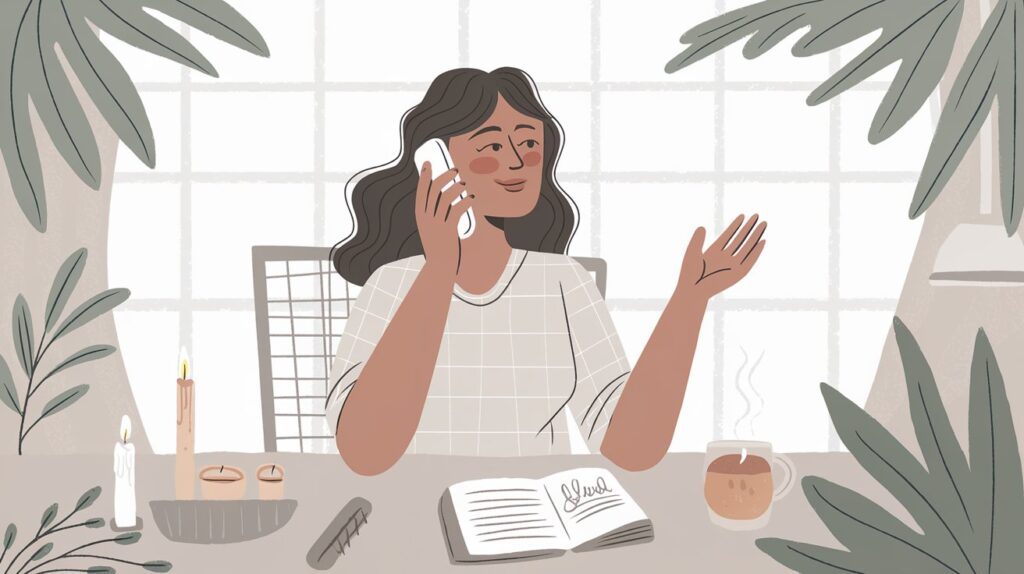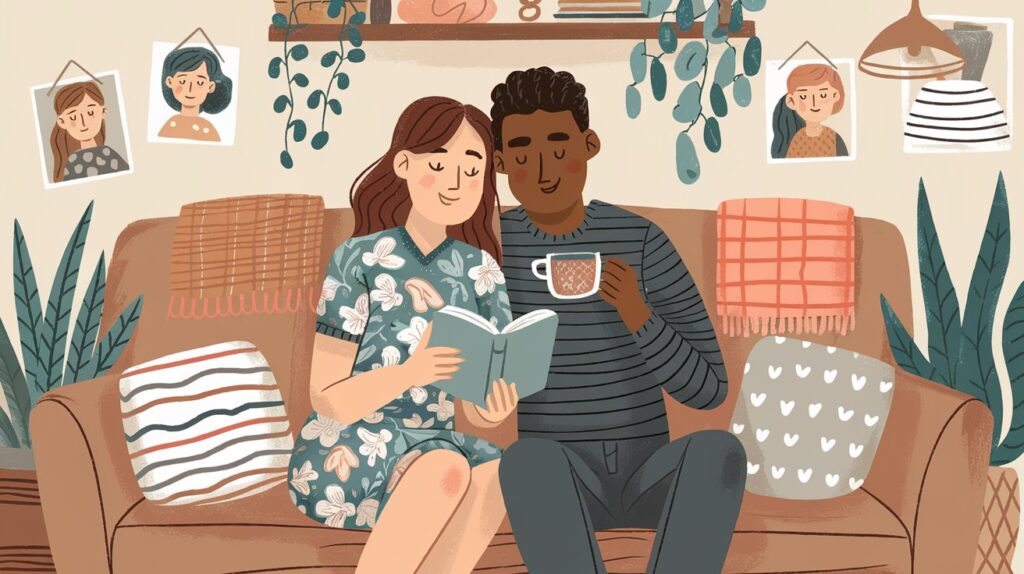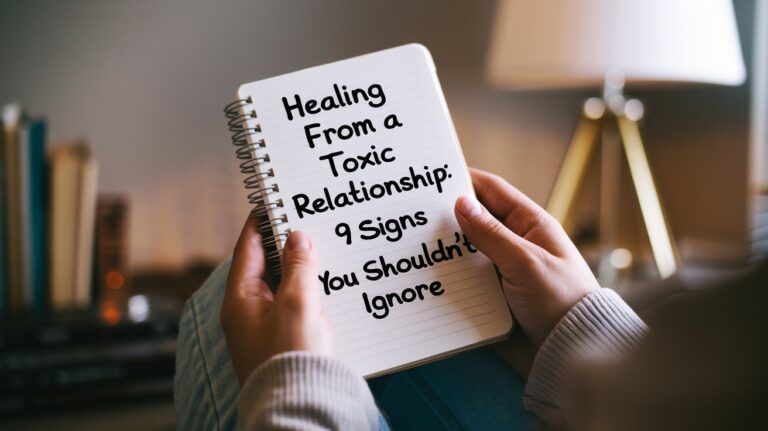The Power of Open Communication in Self-Love: Strengthen Relationships and Set Healthy Boundaries
Welcome to the “Realm of Self-Care”! Here, we discuss the journey of self-love, relationships, and personal growth—because nurturing yourself is the key to living a fulfilling life.
In today’s post, we’ll explore Open Communication in Self-Love and why it’s so important for building strong, healthy connections. Whether you’re learning to set boundaries, recognizing toxic relationships, or simply looking to communicate better with those around you, self-love is at the heart of it all.
Effective communication, both verbal and nonverbal, allows us to foster understanding and trust in relationships. We’ll discuss how to recognize signs of toxic behavior, the importance of self-worth, and how to build open channels of dialogue.
Join us as we unpack the role of self-love in communication and explore practical tips to strengthen your relationships while honoring your worth.
Table of Contents
Understanding Self-Love

When delving into the realm of self-love, it is imperative to grasp the significance of self-worth and the ability to recognize toxic relationships that may hinder personal growth.
Importance of Self-Worth
Self-worth is the foundation upon which self-love is built. It is the acknowledgment of one’s inherent value and the belief in deserving love, respect, and happiness. Understanding and nurturing self-worth is essential in fostering healthy relationships and maintaining boundaries that uphold one’s emotional well-being.
In the journey of self-discovery and personal development, recognizing the necessity of self-worth empowers individuals to set standards for how they should be treated, both by themselves and by others. When one value their own worth, they are more inclined to seek out relationships that contribute positively to their self-esteem and overall happiness.
Recognizing Toxic Relationships

Recognizing toxic relationships is a key aspect of practicing self-love. Toxic relationship habits are often normalized in society, leading individuals to accept behavior that is detrimental to their emotional and mental health. It is crucial to identify signs of toxic relationships, such as manipulation, lack of respect, and emotional abuse, and take steps to address these issues.
In the pursuit of self-love, it is essential to have the courage to walk away from relationships that do not align with one’s values and self-worth. Leaving a toxic relationship, though challenging, is a necessary step towards personal well-being and growth.
By prioritizing self-respect and understanding when a relationship no longer serves their best interests, individuals demonstrate a profound level of self-love and commitment to their own happiness.
Understanding the importance of self-worth and recognizing toxic relationships are fundamental aspects of cultivating self-love and forging healthy connections with others. By valuing oneself and maintaining boundaries that uphold personal well-being, individuals can navigate relationships with confidence, resilience, and a deep sense of self-respect. For more insights on fostering healthy relationships through effective communication, read our article on self-love and healthy relationships.
Self-Love in Communication

Effective communication is a cornerstone of healthy relationships, and self-love plays a crucial role in fostering open and honest communication. Building open communication and being attentive to nonverbal cues are essential elements in nurturing relationships based on mutual understanding and respect.
Building Open Communication
Central to self-love in communication is the ability to establish open channels for dialogue. Successful communication involves expressing oneself in a healthy manner, listening actively to one’s partner, and genuinely absorbing the message being conveyed.
By creating a safe and non-judgmental space for sharing thoughts and emotions, individuals can deepen their connections and strengthen the foundation of their relationships.
Open communication not only allows individuals to express their needs and desires but also encourages them to actively listen to their partners’ perspectives. By fostering a two-way exchange of thoughts and feelings, couples can build trust, empathy, and understanding, thereby enhancing the quality of their interactions and promoting emotional intimacy.
Nonverbal Cues in Relationships
In addition to verbal communication, nonverbal cues play a pivotal role in understanding emotions and intentions in relationships. Nonverbal communication encompasses subtle signals such as tone of voice, facial expressions, body language, and attitude, which can often convey emotions more powerfully than words alone.
Being attuned to nonverbal cues enables individuals to pick up on subtle nuances, emotions, and unspoken messages in their interactions. By paying attention to gestures, eye contact, and other nonverbal signals, individuals can gain deeper insights into their partner’s feelings and effectively respond with empathy and understanding.
Recognizing and interpreting nonverbal cues in relationships can help bridge gaps in communication, facilitate emotional connection, and promote a greater sense of intimacy.
By aligning verbal and nonverbal expressions, individuals can enhance the authenticity and depth of their interactions, fostering a harmonious and fulfilling bond based on mutual respect and emotional awareness.
Boundaries and Respect
In the realm of self-love and relationships, establishing boundaries and showing respect for individual needs play a vital role in fostering healthy and fulfilling connections.
Setting Boundaries in Relationships

Setting boundaries in relationships is essential for maintaining a sense of self-worth and preserving personal well-being. Recognizing toxic relationship habits and having the courage to establish boundaries can help protect individuals from emotional harm.
It’s crucial to communicate your boundaries clearly and assertively, ensuring that your needs and values are respected within the relationship.
Healthy boundaries can include defining what behavior is acceptable, establishing personal space and privacy limits, and communicating emotional and physical boundaries. By setting and enforcing boundaries, individuals can create a safe and respectful environment that promotes mutual understanding and emotional safety.
Respecting Individual Needs
Respecting individual needs is a fundamental aspect of fostering self-love and maintaining a strong sense of self within a relationship. Each person brings unique values, preferences, and boundaries to a relationship, and it’s important to honor and accommodate these differences with empathy and understanding.
Recognizing and respecting individual needs involves active listening, empathy, and open communication. By acknowledging and valuing each other’s preferences and boundaries, partners can create a supportive and nurturing environment that encourages personal growth and mutual respect.
When individuals prioritize setting healthy boundaries and respecting individual needs in their relationships, they pave the way for deeper connections based on mutual understanding, trust, and care.
Embracing self-love through boundary-setting and respect not only enhances individual well-being but also contributes to the overall health and harmony of the relationship.
Moving On and Healing

When it comes to self-love and relationships, the journey of moving on and healing plays a significant role in cultivating a strong sense of self-worth. This process often involves two essential components: leaving toxic relationships and embracing self-love after experiencing heartbreak.
Leaving Toxic Relationships
Leaving a toxic relationship is a fundamental step towards prioritizing your well-being and self-worth. It can be challenging to break free from the grip of a toxic individual, but recognizing the detrimental impact of such a relationship on your mental and emotional health is crucial.
Giving yourself the respect and love you deserve includes walking away from situations that do not honor your worth. This act of self-preservation is empowering and a vital part of self-love and healthy relationships.
Remember, setting boundaries in relationships is essential for maintaining your self-worth and protecting your emotional boundaries. For more insights on establishing healthy boundaries, refer to our article on setting boundaries in relationships.
Self-Love After Heartbreak

Healing from the pain of heartbreak and nurturing self-love in its aftermath is a transformative process. Loving yourself enough to move forward, even after the end of a relationship, is a testament to your strength and resilience.
Self-worth plays a pivotal role in recognizing when it is time to let go of a relationship that no longer serves you. Respecting yourself and valuing your worth are essential aspects of self-love that empower you to make decisions that align with your happiness and well-being in relationships.
Remember, self-love is not only about loving yourself but also about recognizing when to walk away from situations or people who do not uplift or respect you. It is a journey of self-discovery, healing, and growth that allows you to cultivate deeper connections with yourself and others.
By acknowledging your self-worth and prioritizing your emotional health, you pave the way for healthier and more fulfilling relationships built on mutual respect and understanding. If you’re interested in learning more about the importance of communication in relationships, check out our article on importance of communication in relationships.
Strengthening Relationships

Effective communication is at the core of nurturing strong and healthy relationships. By employing communication strategies that promote openness, honesty, and respect, individuals can deepen their connection with their partners and foster a greater sense of intimacy.
Effective Communication Strategies
Communication is the cornerstone of any successful relationship. It involves not only expressing one’s thoughts and emotions but also actively listening to and empathizing with one’s partner. Individuals can create a safe and supportive environment where both parties feel valued and understood by engaging in healthy dialogue.
When it comes to effective communication, asking open-ended questions plays a crucial role in promoting meaningful conversations. By asking questions that encourage detailed responses rather than simple yes or no answers, partners can delve deeper into each other’s thoughts and feelings.
This approach allows for a richer exchange of ideas and fosters a sense of openness and vulnerability in the relationship.
Furthermore, nonverbal cues, such as tone of voice, facial expressions, and body language, are integral components of communication. These cues often convey emotions and sentiments that words alone may not capture.
Being attuned to these nonverbal signals can help individuals better understand their partner’s perspective and respond with empathy and sensitivity.
Creating a Safe Space for Dialogue
In addition to effective communication strategies, creating a safe and judgment-free space for dialogue is essential for maintaining a healthy relationship. Both partners should feel empowered to express their thoughts, concerns, and desires without fear of judgment or criticism.
To cultivate a safe space for dialogue, it’s vital for both individuals to actively listen to each other and validate each other’s feelings. By practicing active listening, partners demonstrate empathy and value their partner’s perspective.
This reciprocal exchange of thoughts and emotions fosters mutual understanding and strengthens the emotional bond between partners.
Scheduling dedicated time for open and honest conversations, such as a weekly ‘Bae Sesh,’ can provide a structured platform for communication. This intentional approach to dialogue allows both partners to voice their thoughts and feelings, resolve conflicts constructively, and deepen their emotional connection.
By prioritizing open communication and creating a safe space for dialogue, individuals can strengthen their relationships, enhance intimacy, and foster a deeper sense of mutual respect and understanding.
Seeking Support and Growth

Navigating the journey of self-love and personal development often involves seeking external support and resources to facilitate growth. Embracing personal development and knowing when to seek professional help are integral aspects of this transformative process.
Embracing Personal Development
Embracing personal development entails acknowledging one’s self-worth and making decisions that align with a sense of self-respect and empowerment. It involves recognizing when a relationship no longer serves your well-being and having the courage to walk away from situations that diminish your value.
This act of self-love is a powerful assertion of your worth and can lead to healthier relationships and improved self-esteem.
The authors at Think Aloud delve into various topics related to psychology, dating, relationships, mental health, and astrology, offering insightful articles and life coaching to empower individuals to enhance their personal lives.
By educating yourself and actively engaging in personal growth, you can cultivate a deeper sense of self-awareness and self-love, paving the way for more fulfilling relationships and greater emotional well-being.
Seeking Professional Help

There are times when seeking the guidance of a professional can be beneficial in fostering personal growth and enhancing self-love. Leslie Blair, a dedicated dating and relationship coach at Think Aloud, is passionate about helping individuals develop more meaningful and authentic relationships with themselves and others.
Through personalized guidance and support, Leslie helps people identify and overcome obstacles that may be hindering their ability to experience healthy intimacy and self-fulfillment.
By seeking professional help, whether through coaching, therapy, or counseling, individuals can gain valuable insights, acquire effective tools for self-improvement, and navigate challenges in relationships with greater clarity and understanding.
Professional support can serve as a valuable resource in promoting self-awareness, resilience, and personal growth, ultimately contributing to a more profound sense of self-love and fulfillment in both individual and relational contexts.








One Comment